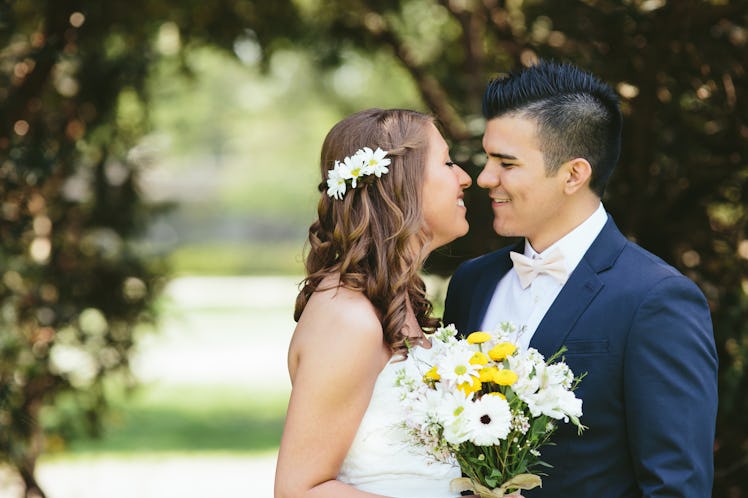
Here's What Can Happen When You Get Married Right After College, According To Experts
Whether you found the love of your life on the first day of orientation, or your long time campus crush became your real life happily ever after, you may be walking down the aisle soon after you snag your diploma. If your friends got hitched soon after school, or you're a soon-to-be new spouse yourself, it may be hard to know what happens when you get married right after college. Do you stop going out? Do you have a family right away? Does your college mascot show up to the wedding? (Spoiler: There is no one answer. Every couple is different, and every pair will find what works best for them.)
If you're a history buff, a hopeless romantic, or just interested in the old days, it may interest you to know that in the '80s, the average age for marriage for women was 22, and in the '50s it was 20. Cue the sparkling cider toasts on your big day. According to the U.S. Census Bureau, the average age that women tied the knot in 2017 was 27.4 years, with men saying their vows at an average age of 29.5.
I asked three mental health professionals about what happens when you say "I do" right after throwing your graduation cap. Here's what they had to say.
There Will Be Lots Of Opportunity For Change
Joshua Klapow, Ph.D., Clinical Psychologist and Host of 'The Kurre and Klapow Show,' tells Elite Daily that tying the knot young means that there will be more opportunity for big life changes in your relationship.
The younger the couple marries, the more time and opportunity there is for individual desires, preferences and life paths to change. Each putting a challenge to the relationship that may or may not be embraced and accepted. This does not mean that getting married young inherently means the relationship will not survive — it just means there are more changes in front that can take a couple off path. From career decisions to broader life decisions each incremental change that one or the other or both partners makes has an impact on the relationship. The ability, willingness and desire to adapt, compromise and embrace the changes really determine the success of the relationship.
Getting married after college can mean cultivating a willingness to embrace change and be adaptable in life. With jobs, houses, family planning, and so many other things to look forward to post-grad, an ability to go with the flow can be super helpful.
Stuff Will Get Real
After the honeymoon phase, and the literal honeymoon, you and your spouse will have to start, well, living life. Dr. Gary Brown, a prominent dating and couples therapist in Los Angeles explains that marriage won't absolve you of life's challenges, at any age.
The answer really is dependent upon the couple. It can be a real challenge if you don’t know what your immediate future is going to look like. Instability with finances, jobs, and career uncertainty can certainly add strain to a couple getting married right after college. Are you thinking that marriage is going to automatically provide you with lifelong and permanent emotional stability? It won’t. Is having regular sex in the marital bedroom going to be a cure-all for the problems that may exist in your relationship? Unlikely. (Although, it can be great.)
After graduation, life takes on a bunch of new moving pieces. You may have found your prince/princess/genderless-royal to be with forever and always, but life is still going to happen. The good news is: with open communication and support, you can start to tackle the world together.
You'll Learn As You Go
For Shula Melamed, MA, MPH, and wellbeing coach, marriage right after college is more about knowing that you don't know everything, and continuing to have open and honest conversation.
Couples who get married right after college might get catapulted into more serious conversations about the future because of the symbolic and legal responsibilities that come with marriage. If you are in it for the long haul working on communication is key and not expecting yourselves to know everything or have reached a certain level of relational maturity just because you have taken this big step. Your 20s are an incredible time of growth, learning and processing — no one gets to skip this part even if they have found their life partner! The most important thing to recognize and discuss is how you will support each other in your careers, how you will make decisions about where to live and how you will handle the practical, domestic aspects of running a home, life and juggling ambitions together.
Even if you've found your life partner, you inevitably have a lot of life lessons to learn in your 20s. According to Melamed, being able to discuss these changes, and they ways in which you will be able to support your spouse can make all the difference.
If you found "the one," took your vows, or swapped rings officially soon after school, you and your boo will get to learn a lot about yourselves and each other. From jobs to grad school to family, there's a lot of life that happens right after college, and a lot to share with a forever-boo.